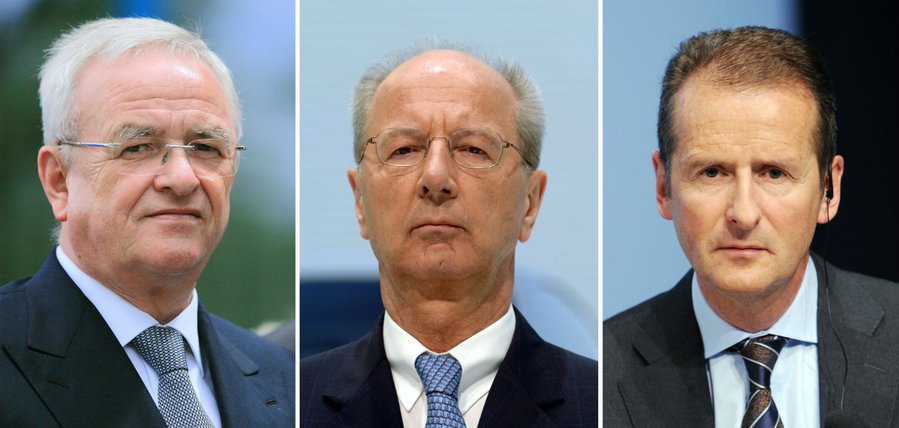VW's top officers charged in Germany over diesel scandal

German prosecutors said Tuesday they have charged Volkswagen's current chief executive and chairman as well as its former CEO with market manipulation in connection with the diesel emissions scandal that erupted in 2015.
CEO Herbert Diess, Chairman Hans Dieter Poetsch, and former chief Martin Winterkorn are accused of deliberately informing markets too late about the huge costs to the company that would result from the scandal, prosecutors in the city of Braunschweig said.
That, they said in a statement, meant the executives had improperly influenced the company's share price.
The charges, which Volkswagen rejected, could require Diess to spend significant time on his defense, distracting him at a crucial time for the company, which is trying to move on from the scandal and is recasting its business to focus on new - cleaner - technologies like electric cars.
The prosecutors argued that Winterkorn had been aware of the issue and the potential resulting damage since at least May 2015, Poetsch since June 29 and Diess since July 27. Each of them should have ordered the release of an ad hoc statement for markets at that point, the prosecutors said.
However, the scandal only broke when U.S. authorities went public with it on Sept. 18, 2015.
Winterkorn resigned shortly after the scandal became public. Poetsch was chief financial officer at the time and became chairman of the supervisory board in late 2015. Diess arrived at the company on July 1, 2015, shortly before the scandal broke, and was initially the head of its core Volkswagen brand.
Winterkorn was succeeded as CEO by Matthias Mueller, who was then replaced by Diess in April 2018.
Volkswagen swiftly rejected the charges, saying it had "meticulously investigated" the matter with the help of internal and external legal experts over nearly four years.
"The result is clear: the allegations are groundless," Hiltrud Dorothea Werner, the board member responsible for integrity and legal affairs, said in a statement. She added that, if the indictment goes to trial, the company is "confident that the allegations will prove to be unfounded."
The company's supervisory board said it had already considered the possibility of charges, and that the board's executive committee "will convene a meeting immediately to discuss next steps" following the indictment.
Tido Park, a lawyer for Diess, told German news agency dpa that the indictment won't restrict Diess from performing his duties as CEO.
It is not unprecedented for a German CEO to continue while fending off charges. Deutsche Bank CEO Josef Ackermann was required to spend two days a week defending himself against charges of breach of trust in connection with his duties as a board member of mobile phone concern Mannesmann. Ackermann, who is no longer CEO, was found not guilty in 2004.
Shares in the car giant dropped 2.4% on the news.
Volkswagen admitted installing software in its diesel cars that turned on pollution controls when vehicles were being tested and switched them off during everyday driving. That made it look as if the cars met tough U.S. limits on harmful pollutants known as nitrogen oxides.
In all, some 11 million cars worldwide were equipped with the illegal software.
The diesel scandal has cost Volkswagen more than 30 billion euros ($33 billion) in fines, recall costs and civil settlements.
The automaker apologized and pleaded guilty to criminal charges in the United States, where two executives were sentenced to prison and six others charged, although they could not be extradited.
In a separate case, prosecutors in April charged Winterkorn and four others with fraud in the emissions cheating scandal, which has helped turn many Europeans against diesel engines and accelerated the push toward electric cars.
Prosecutors alleged that Winterkorn knew about the scheme since at least May 2014 and failed to put a stop to it. That contradicted his claim that he didn't learn about it until shortly before U.S. investigators announced it in September 2015.
Nouvelles connexes


